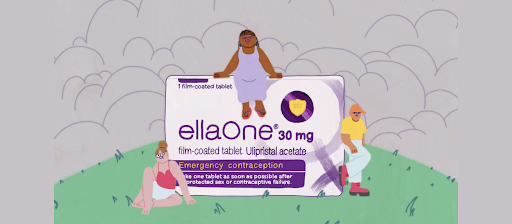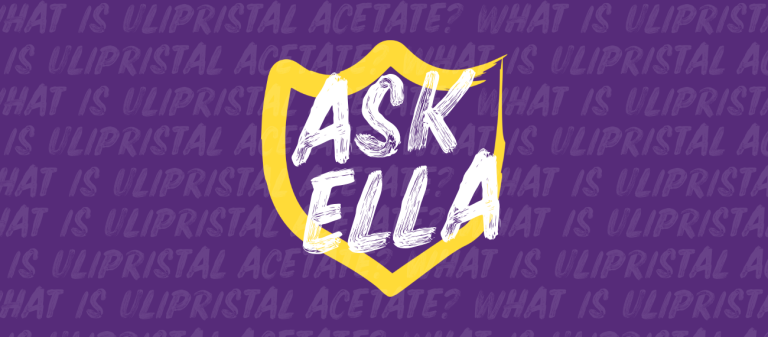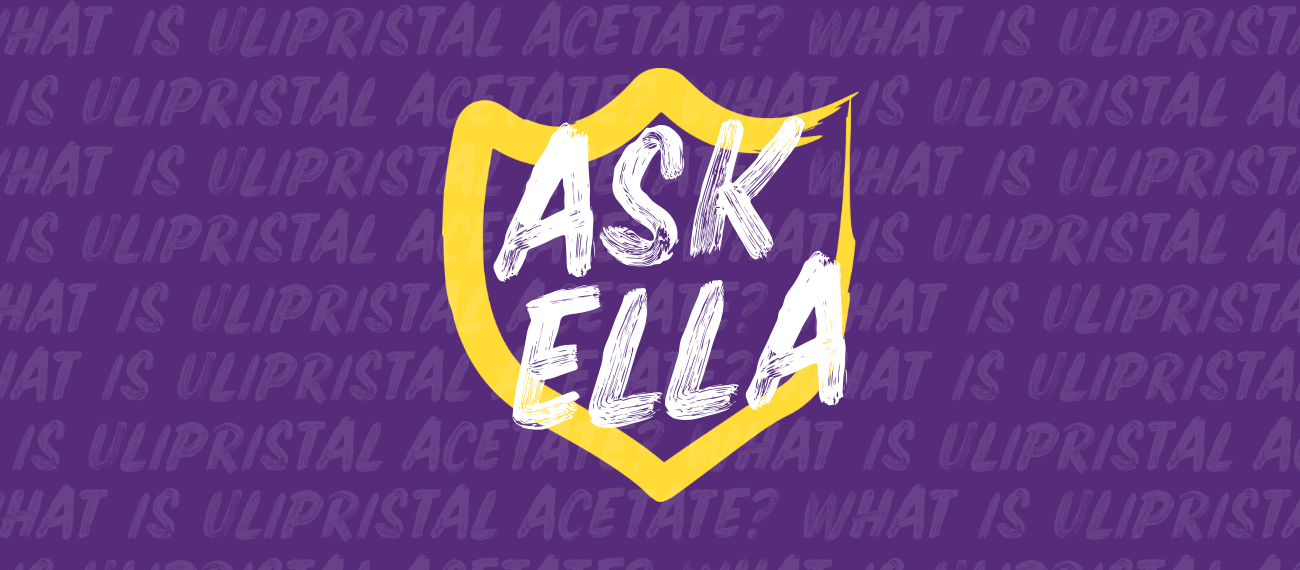If you’ve taken ellaOne®, the the UK’s preferred morning after pill*, or if you’ve been on our website or seen some of our social posts, you may have seen that ellaOne® contains ulipristal acetate – and you may be wondering what that is.
Knowing what you’re putting in your body is important, and we want you to feel empowered to make informed decisions about your contraception and emergency contraception.
*Based on sales data. Verify at ellaone.co.uk/verifyellaone.co.uk/verify
What is ellaOne®
First things first, let’s go over what ellaOne® is. ellaOne® is a hormonal emergency contraceptive pill – also known as a morning after pill, even though it can be taken any time of the day up to five days after unprotected sex!
If you’ve had unprotected sex or experienced contraceptive failure (so if the condom broke or you missed your pill) then you can take ellaOne® to help prevent unplanned pregnancy.
The active ingredient in ellaOne® is ulipristal acetate. So how does it work?
What is ulipristal acetate?
“Ulipristal acetate is a synthetic medicine which binds to the receptor for progesterone* (an area on or in the cell to which progesterone attaches), thereby blocking the action of progesterone because its receptor is blocked. It is often called an anti-progesterone (or anti-progestin) or sometimes a progesterone receptor blocker,” says Professor Anna Glasier**, a world expert in emergency contraception.
**Anna Glasier does not endorse any products or brands.
Progesterone is a hormone which play an important role in the menstrual cycle and pregnancy.
Basically, the menstrual cycle has three phases: follicular, ovulatory, and luteal. The follicular stage begins on the first day of your period. During this phase, your body prepares for ovulation (egg release) by releasing follicle stimulating hormone (FSH). This is the hormone which helps with the development of eggs in the ovaries. By around day 6, a single egg in your ovaries becomes dominant and continues growing. Once this has happened, your levels of FSH decrease.
The ovulation phase happens around midway through the cycle when you get a surge of luteinizing hormone (LH). LH is the hormone which triggers the release of an egg from your ovaries to make its way to your uterus. Ovulation usually happens around day 14 of your cycle, but this can vary from person to person and from cycle to cycle.
This is why it can be really hard to pinpoint the exact moment of ovulation, as ovulation can happen from day 11 all the way up to day 21, and just because you ovulated on day 12 one month doesn’t mean it’ll happen on the same day the next month. Find out more about what can affect your menstrual cycle here.
One released, the egg can survive for 12 to 24 hours, and if it isn’t fertilised during this time it dissolves.
During the luteal phase, increases in progesterone and oestrogen allow your body to begin to prepare for implantation in case the egg that has been released is fertilised with sperm. Progesterone is responsible for the lining of your uterus, called the endometrium. The rise in progesterone is telling your uterus to start thickening this lining in preparation for a potential pregnancy.
How does Ulipristal Acetate work?
So what has this got to do with ulipristal acetate? Well, as we saw above, ulipristal acetate works by binding to the body’s progesterone receptors to produce an anti-progesterone effect, which suppresses or delays ovulation from the ovary. It also decreases the endometrium thickness. As progesterone is really important for pregnancy, ulipristal acetate works by blocking the hormone’s effects to help prevent pregnancy.
ellaOne®, which contains ulipristal acetate as its active ingredient, can be effective at preventing pregnancy up to five days after unprotected sex – although it is most effective when taken as soon as possible. ellaOne® can be effective right up to the point of ovulation, but it will not be effective if you have already ovulated and it cannot harm an existing pregnancy. Find out more about ellaOne® and ovulation here.

Can you use ulipristal acetate whilst breastfeeding?
We don’t currently know if ulipristal acetate has a negative impact on breast milk, so we recommend not breastfeeding for one week after taking ellaOne®. If you take ellaOne® whilst breastfeeding, we recommend you discard the milk for 7 days after taking the tablet.
Does ulipristal acetate prevent implantation?
“At the dose used for emergency contraception there is no evidence that ulipristal acetate inhibits implantation,” says Professor Anna Glasier.
Emergency contraceptive pills which, like ellaOne®, contain ulipristal acetate work by delaying ovulation, so the egg is not released and there is nothing for any lingering sperm to fertilise. If ovulation has already occurred, ulipristal acetate cannot prevent implantation and will not affect an existing pregnancy.
Is ulipristal acetate a hormone?
“It is an anti-hormone. Its structure is very similar to that of the hormone progesterone, and it binds to the progesterone receptor, but it does not act like progesterone and progesterone cannot have its normal effect because its receptor is blocked by ulipristal acetate,” says Professor Anna Glasier.
We hope this helps you better understand your menstrual cycle and the effects of ulipristal acetate! If you have any other queries about ellaOne®, head over to our Ask Ella section or get in touch @ellaOneUk.
Have you ever taken the morning after pill? Why not share your experience to help us end the stigma.
References
https://www.ncbi.nlm.nih.gov/pmc/articles/PMC3138379/#:~:text=Ulipristal%20acetate%20exerts%20its%20pharmacological,(by%20decreasing%20endometrial%20thickness).




